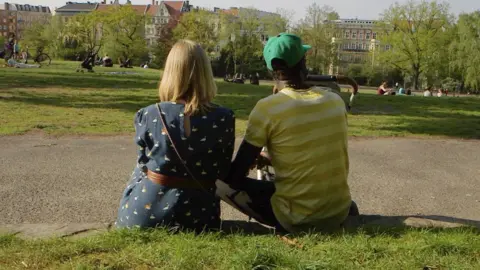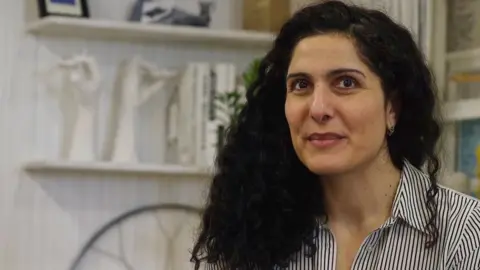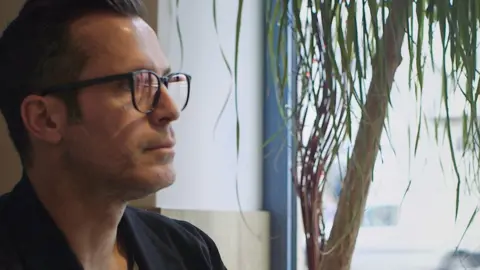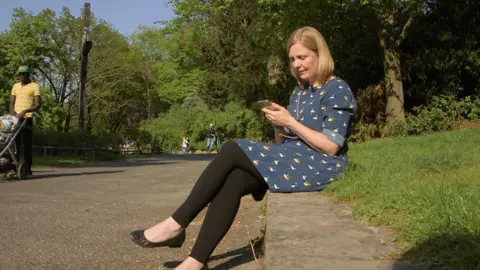'#IAmHere': The people trying to make Facebook a nicer place
A network of tens of thousands of online volunteers is fighting hate speech on Facebook. They organise under the slogan "#IAmHere".
It's 7:30 in Berlin, and Nina's alarm clock is going off. Before getting up and making breakfast for her 13-month-old daughter, who is sleeping in the next room, she reaches for her phone.
Unlike many of us, Nina's not checking her emails, the news, or looking at gossip sites or posting photos. Instead, every day Nina opens up Facebook and heads straight to the closed group #IchBinHier ("#IAmHere").
Nina is part of an international movement working to find and combat hate speech on the platform. She and her fellow #IAmHere members spend their spare time scanning Facebook for conversations happening on big pages, often run by mainstream media organisations, which are overwhelmed with racist, misogynistic or homophobic comments.
They don't attempt to change the minds of people posting hate or argue directly with extremists. Instead they collectively inject discussions with facts and straightforwardly argued reasonable viewpoints. The idea is to provide balance so that other social media users see that there are alternative perspectives beyond the ones offered up by the trolls.
The volunteers also say they don't target conservative views or any other mainstream opinions. Instead #IAmHere activists - there are tens of thousands of them in groups across Europe and around the world - say their mission is to change the overall tone of online debate, counteract hate storms and make Facebook a nicer place overall.
And the social media giant has picked up on the phenomenon. Facebook has provided #IAmHere groups with free advertising credits and helps them organise meet-ups as part of its Online Civil Courage Initiative.
Why do they do it?
Nina, 39, says she spends around three hours a day moderating comments on top of her full-time job as director of an NGO. But she has very personal reasons for devoting a large chunk of her busy schedule to the campaign.
Her husband is from Uganda, and she says they both have felt angry and scared by what they perceive as a rise in racist, anti-immigrant rhetoric on social media over the past few years.
"As a couple in this still very white Germany, we are exposed in a way," she says. "I think our feeling that we have to change something got stronger.
"I cannot imagine [my daughter] growing up and reading all these things. I do not want this culture."


You may also be interested in:

Nina posted her first comment on behalf of the group in February 2017 after #IchBinHier was endorsed by a popular German TV presenter. "My heart was beating a lot the first time I used the hashtag… It felt amazing to finally have a group behind me."
In Germany, Nina says articles about asylum seekers or climate change protests tend to attract a lot of anger. User comments include racial or ethnic slurs, or include violent images of guns or guillotines. Some comments and pictures can be much worse.

Hear more on this story on the Trending podcast from the BBC World Service: Download now

Where did it start?
#IAmHere was founded in Sweden, where it is called #JagArHar, by Iranian-born journalist Mina Dennert. Around three years ago she says she noticed social media becoming, as she describes it, "flooded with hatred", so she began trying to counter misogynistic and racist comments "in a calm, non-aggressive way".
"I've experienced so much racism throughout my life, I wasn't scared to do this," she adds.

After a while working mainly on her own, Dennert figured she could make more impact with a group behind her: "I reached out to get other people involved. A lot of them were like, 'This is fantastic, I've been feeling so alone with this.'"
Media attention soon followed and the Swedish group grew to 75,000 members. As word spread, similar groups began popping up in other countries including Italy, France, Slovakia, Poland and the UK. Today, there are 14 different #IAmHere groups working towards the same goals in their respective languages.
The groups stick to fighting hate speech, which Facebook defines as a "direct attack on people based on protected characteristics - race, ethnicity, national origin, religious affiliation, sexual orientation, caste, sex, gender, gender identity, and serious disease or disability."
The German group, #IchBinHier, was founded by marketing consultant Hannes Ley. It currently has 45,000 members.
"I had some Swedish friends come to stay in December 2016," he explains. "I came into the kitchen one morning and one of them was posting comments on Facebook. I asked what he was doing."
Ley says he had "a really positive gut feeling" the minute his friend explained the concept. "I was reading comments for many years and I felt rather helpless because of the quantity of hate speech. I thought, OK, we can try to make another majority to confront the hate speech crowd."
Ley says the group is welcoming of diverse political views. "The majority of our members are left and liberal and we have some conservative members," he says. "We have to tolerate different opinions in a democracy. But if it becomes aggressive, if it becomes violent, this is where #IchBinHier interrupts."

As the German group grew, some members became curious about the commenters they were interacting with. "I was very astonished by the number of likes some comments were getting, ones that would really vilify migrants," says Philip Kreissel, a 23-year-old political science student and #IchBinHier volunteer.
Intrigued to see whether he could find some kind of organised activity taking place, he began doing data analysis.
"I found that some of these accounts were really [very] active and were 'liking' all day, and this created a bias in social media."
Dealing with the backlash
Further digging made it clear that many users creating and liking hateful comments were just as organised and targeted as #IAmHere. Researcher Jacob Davey, an expert on the far right at the London-based Institute of Strategic Dialogue (ISD), says: "Troll armies bring themselves together in almost semi-military style hierarchies.
"You can see these groups coming together and engaging in harassment on Facebook, which appears to be both silencing moderate discussion and dominating certain discussion points."
Going up against these troll armies does not come without risks. "2018 was an election year in Sweden and they started making up the craziest stuff about us, that we were weapons dealers or supporting terrorists," says Dennert.
Members of the Swedish group were doxxed - they had their personal information posted online. Dennert, her husband and two children requested police protection after the threats got particularly vicious.
In Berlin, Nina has also been subject to intimidation. "One troll mentioned my child, as he saw on my work's website I was on parental leave. That really creeped me out, and I thought for a moment 'Should I be doing this?'"
She admits that being confronted with hateful comments on a daily basis can take a toll on members' mental health. "It depends on my daily mood," she says. "Some days I can take so much I amaze myself. Others, I feel my skin is very thin."
Should Facebook do more?
Facebook has provided the volunteers with free ad credits and support in organising meet-ups. Despite being grateful for the help, many #IAmHere members believe the platform should do more to combat hate speech. Ley says Facebook needs to "live up to its own community standards" and be quicker at deleting comments.
In a statement, Facebook says it uses a mix of proactive technology and human moderation, and that its efforts to tackle hate speech have improved. For instance, the company says it has banned more than 200 white supremacist organisations.
Starting in 2018, Germany's NetzDG law required social media sites to remove hate speech within a day of it being reported, and analysis shows that explicitly racist posts have decreased on Facebook since then. A study of #IchBinHier activity by researchers at the University of Dusseldorf also found that its commenters are often successful at changing the tone of online debates.
On the other hand, research carried out by Kreissel and the ISD found that coordinated right-wing extremist online hate campaigns have increased three-fold since December 2017.
"I don't see it getting better, I see it getting worse," says Nina. She says she often feels "hopeless" when confronted with the daily barrage of hate, and she believes "what we say online will affect our offline actions eventually".
But this is another reason she keeps going. "I think it's made me more courageous in offline situations," she says. "Recently, two men were shouting at each other on the subway and I just got in between them and said, 'What are you doing?'
"It equips me for being with my daughter in this world - if someone makes a comment on how she looks, I'm fast to react.
"It's in me… It's part of my life."

Do you have a story for us? Email BBC Trending
You can follow BBC Trending on Twitter @BBCtrending, and find us on Facebook. All our stories are at bbc.com/trending.

BBC Crossing Divides

A season of stories about bringing people together in a fragmented world.

